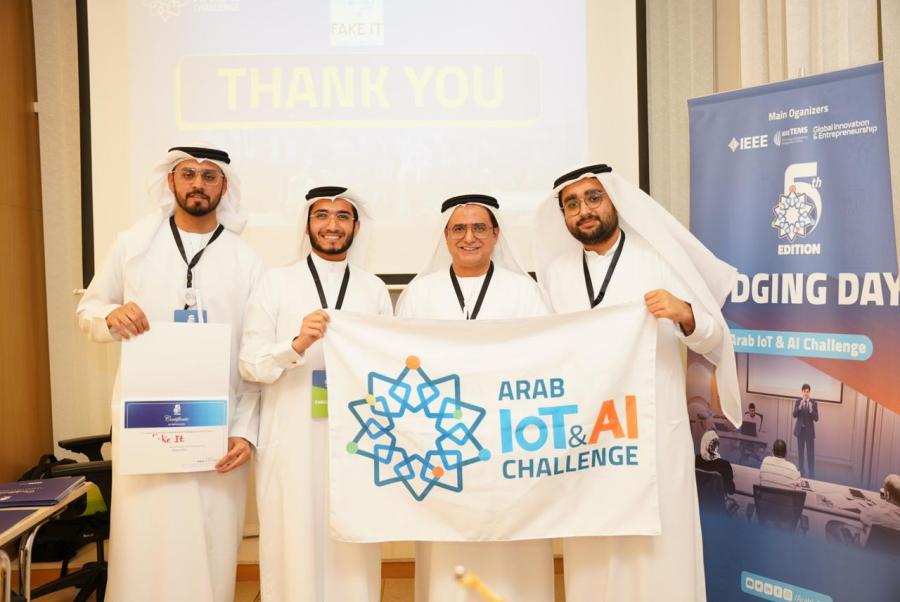- About
- Admissions
- Study at AUS
- Prospective Students
- Bachelor's Degrees
- Master's Degrees
- Doctoral Degrees
- Admission Publications
- International Students
- Contact Admissions
- Grants and Scholarships
- Sponsorship Liaison Services
- Testing Center
- New Undergraduate Student Guide
- New Graduate Student Guide
- File Completion
- New Student Orientation
- Payment Guide
- Executive Education
- Students with Disabilities
- Academics
- Life at AUS
- Research
- Contact Us
- Apply Now
- .

AUS students’ deepfake detector wins second place at Arab IoT & AI Challenge
Fake it, a deepfake detection application developed by an American University of Sharjah (AUS) team, won second place at the prestigious Arab IoT & AI Challenge 2023, competing against work by more than 1,000 contestants from 13 countries.
Called Fake It, the application is a sophisticated deep neural network, trained on an online dataset for scalability to scrutinize facial features within videos and assign a “fakeness” score that can help determine whether videos are authentic or counterfeit. Designed with a keen understanding of the diverse population of the UAE, Fake It sets itself apart by detecting deepfakes tailored specifically for this region.
The AUS team comprised Master of Science in Electrical Engineering students Muhammad Riyyan Khan and Shahzeb Naeem, and undergraduate finance student Mohammad Lootah, led by AUS electrical engineering professor Dr. Usman Tariq and co-supervised by Dr. Hasan Al-Nashash and by Dr. Abhinav Dhall from the Indian Institute of Technology Ropar.
"Securing second place in the Arab IoT & AI Challenge 2023 represents a significant milestone for our team. Our unwavering dedication, collaboration and innovative problem-solving culminated in a practical and scalable solution. Competing against teams from 13 countries was surreal, and winning filled us with immense pride. Representing the UAE and AUS was an honor, igniting our passion to push technology's boundaries further. We're deeply grateful for AUS' support and our team's collective efforts," said Muhammad Riyyan Khan.
Team member Mohammad Lootah noted that the Fake it application encompasses both technical ingenuity and a strong business orientation, offering a solution as the world becomes increasingly exposed to the risks of AI-generated content.
“Recognizing that existing pre-trained models relying on online datasets may not suffice for the diverse landscape of the UAE, we have embarked on a path of innovation. Our application introduces an engaging approach to data collection, facilitating continuous model enhancement for heightened precision tailored to the UAE's market demands. Beyond its role in public deepfake detection, this technology holds the promise of future commercialization as a startup, once our dataset and software reach full maturity. Furthermore, it can serve as a robust cybersecurity asset for applications such as UAE Pass and banking applications, bolstering security measures comprehensively," he said.
Dr. Tariq said: "It's been a remarkable journey working alongside these talented students. The Fake It team's achievement showcases their exceptional dedication and innovation. I'm proud to have supervised our team, and I believe their success highlights AUS's commitment to nurturing excellence in interdisciplinary projects."

